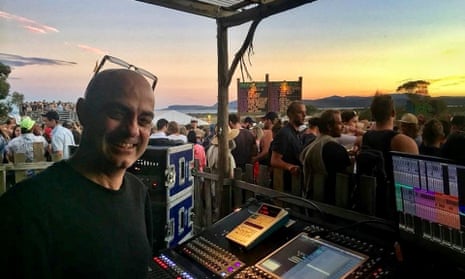Road crew for some of the biggest bands in music are being forced into homelessness and turning to food banks to survive during the pandemic.
Stagehand, the charity for roadies, has given more than 1,000 grants so far and said 13% of those receiving money had needed support from food banks.
It said about 20% of stage hands have not qualified for any government help during the pandemic, including the £4.5bn freelance fund and £1.5bn arts grants.
Musicians and performers have rallied with personal donations and fundraising, but Andy Lenthall, the general manager of the Production Services Association, which set up the charity, said people were still “slipping through the cracks”.
“One guy we helped this week has been waiting for a food bank voucher because he hasn’t eaten properly for two weeks. In 2019 he was driving a forklift around Hyde Park. Now he’s got to choose between heating or eating.
“It’s embarrassing and upsetting. People are sofa surfing, selling their houses – some of the claims we are getting are from people putting ‘no fixed address’ on their forms. Senior people are cashing in their pensions if they’re over 55.”
Shan Hira was in Australia as the live sound engineer for New Order’s world tour when the pandemic struck last year. His 35-year career has proved no help in finding other work. “I’ve tried to get work doing fruit picking, civil service jobs, the national census, delivery driving – I’ve had nothing,” Hira said. “This is after I’d looked at the obvious places in the music industry. I’ve got quite a niche set of abilities – I’ve been trying to be the best at what I do.”
He has tried retraining in broadcast sound engineering and digital production. His latest effort is to become a Covid supervisor, ensuring film and TV sets are Covid-secure. “I’m going through my savings and once they’re gone, I’ll have to sell the house. I’ve got months, not years.”
Production manager Robin Scott was backstage in Copenhagen when the Simple Minds world tour was cancelled. As production manager, he was responsible for everything from booking trucks to building the stage.
“I went from being the guy who usually has all the answers to having none. I’ve no idea when I’ll be paid again for doing a job. The uncertainty is so unsettling. I get just over £500 a month and that just covers the mortgage. I’ve sold my car. I’m a keen cyclist and I’ve sold my bikes. I’ve gone for job interviews and you just don’t hear back.”
The latest attempt to raise money for road crew is #ILoveLive, backed by artists including the Spice Girls, Queen, and KT Tunstall. It launched a prize draw last week at crowdfunder.co.uk/i-love-live. Fans can buy tickets to win memorabilia including the Spice Girls’ union flag sofa, guitars donated by Billy Bragg, Keane, and Simple Minds, and a snare drum from Dave Grohl and other memorabilia as well as concert tickets. “We’ve raised £1.3m, but it’s not nearly enough,” Lenthall said.
Rob Love, the founder of Crowdfunder, which is hosting #ILoveLive for free, said: “Without roadies there won’t be a live events industry, even when Covid restrictions are lifted. Crowdfunding is needed because clearly the help available isn’t reaching everybody and if that continues we risk losing an industry that brings so much joy to all of our lives.
“These people have worked for 30 or 40 years and paid taxes, but because they are technically self-employed many have had no support from the government and are now relying on foodbanks.”
Keane – made up of Tom Chaplin, Tim Rice-Oxley, Richard Hughes and Jesse Quin – have donated a guitar and handwritten lyrics. They said: “When we do a gig only a small percentage of that experience for the audience is down to what we do as musicians. I mean, we do our best, but without the incredible sound and lights it would be absolutely rubbish.
“ Beyond the big show you experience, there is also: getting everyone and all the equipment around, maintaining all the equipment, feeding everyone, logistics, managing our frail egos and a whole huge list of other things that happen that the audience don’t really know about.
“All the people who do that work are highly experienced and knowledgeable professionals. They’re not the old-fashioned roadies that wear leather waistcoats that you might imagine, they’re mega clever and know things like the physics of acoustics, what an IP address is, why the sky is blue, stuff the rest of us have no idea about.
“ Without gigs, there is no work for them. If there’s no work, they can’t pay their bills and look after their families.”
A Treasury spokesperson said: “Throughout this crisis, we have done all we can to support jobs and livelihoods, spending over £280bn in response to the pandemic. Our self-employed and furlough schemes are among the most generous in the world … and have protected over 12 million jobs since the start of the pandemic.
“Funding is designed to target those who need it most and protect the taxpayer against fraud and abuse. Those not eligible may still be able to access our loans schemes, tax deferrals, mortgage holidays and business support grants.”
“We continue to keep our schemes under review and will set out the next stage of economic support at the budget.”









